California Indemnity and Defense Construction Law Changes for 2013
April 03, 2013 —
William L. Porter, Esq. - Porter Law GroupDeath of “Type 1” Indemnity in California Construction
For many years the prevalence of the “Type 1” indemnity clause has been the subject of fierce debate within the construction industry. Subcontractors have complained that they are saddled with indemnity obligations that require them to indemnify contractors from construction-related claims for which these subcontractors are truly not responsible. In defense, contractors have argued that they must be entitled to the freedom to set contractual terms to best protect themselves and they point out that subcontractors are certainly free to negotiate better terms or turn down work.
After many years of debate and small legislative inroads in prohibiting Type 1 indemnity in residential projects and where it concerns the “sole negligence”, “willful misconduct” or the “design defects” of others, the California legislature has finally spoken broadly and definitively on the issue of Type 1 indemnity clauses in construction contracts. Under new Civil Code section 2782, beginning with contracts entered into on or after January 1, 2013, broad “Type 1” indemnity clauses shall be void and unenforceable in the context of both private and public construction projects in California. Civil Code section 2782 now makes it clear that subcontractors can no longer be required to indemnify against another’s active negligence in connection with construction contracts, whether public or private.
Read the court decisionRead the full story...Reprinted courtesy of
William L. Porter, Esq.William L. Porter, Esq. can be contacted at
bporter@porterlaw.com
Can You Really Be Liable For a Product You Didn’t Make? In New Jersey, the Answer is Yes
December 14, 2020 —
James Burger & Robert Devine - White and Williams LLPNew Jersey has recently expanded liability for product distributors and manufacturers to products that the distributor/manufacturer did not make or sell. This alert discusses this new law and steps that distributors and manufacturers may consider to reduce their potential liability.
In Whelan v. Armstrong International, Inc., the New Jersey Supreme Court held that distributors and manufacturers can be strictly liable for injuries caused by replacement parts added after the point of sale which had not been manufactured or sold by any of the defendants in the case. In Whelan, the defendants’ products had originally been sold with asbestos-containing parts. Mr. Whelan, the plaintiff, argued that asbestos-containing replacement parts were required to repair and maintain the products. The court found that because the products were designed with asbestos-containing parts, “[d]efendants had a duty to provide warnings given the foreseeability that third parties would be the source of asbestos-containing replacement components.” (Emphasis added).
This reasoning, based on “foreseeability,” should give pause to all product distributors and manufacturers—even those who do not make or sell products that contain asbestos. Certainly distributors and manufacturers of products with asbestos-containing parts must take heed that they may now be liable for replacement parts that they neither manufactured nor sold. This alone is a significant holding that expands potential liability.
Reprinted courtesy of
James Burger, White and Williams LLP and
Robert Devine, White and Williams LLP
Mr. Burger may be contacted at burgerj@whiteandwilliams.com
Mr. Devine may be contacted at deviner@whiteandwilliams.com
Read the court decisionRead the full story...Reprinted courtesy of
Recovering Attorney’s Fees and Treble Damages in Washington DC Condominium Construction Defect Cases
April 03, 2023 —
Nicholas D. Cowie - Cowie Law GroupDC Condominium Association’s Can Recover Attorney’s Fees, Litigation Costs and Treble Damages in Construction Defect Cases Involving Misrepresentation
The District of Columbia Consumer Protection Procedures Act (“CPPA”) § 28-3905(k)(1)(A) creates a private legal claim (a/k/a “cause of action”) which can be asserted by a condominium unit owners association (“condominium association”) on behalf of two or more of its unit owner members who are misled by a condominium developer regarding the condition or quality of a newly constructed or newly converted condominium. Under the DC CPPA, a successful claimant is entitled to recover “treble damages” (i.e., three times the amount of damages it proves), plus recovery of “reasonable attorney’s fees” incurred in prosecuting the construction defect claim and “[a]ny other relief the court determines proper,” including non-attorney fee litigation expenses. DC CPPA § 28-3905(k)(2)(A), (B) and (F).
The CPPA Creates the Legal Claim that Allows a Condominium Associations to Recover Attorney’s Fees, Litigation Costs and Treble Damages
The DC CPPA is a consumer-oriented statute designed to protect Washington DC consumers misled in connection with the purchase of consumer “real estate,” including transactions involving the purchase of a condominium unit and interest in the condominium common elements. Typically, these cases involve the sale of a newly constructed or newly converted condominium, which, contrary to developer representations, contains latent construction defects.
Read the court decisionRead the full story...Reprinted courtesy of
Nicholas D. Cowie, Cowie Law GroupMr. Cowie may be contacted at
ndc@cowielawgroup.com
20 Years of BHA at West Coast Casualty's CD Seminar: Chronicling BHA's Innovative Exhibits
May 03, 2018 —
Beverley BevenFlorez-CDJ STAFFThe Bert L. Howe & Associates, Inc., (BHA) exhibit has been a fixture at West Coast Casualty's Construction Defect Seminar since the mid-1990's. Through the years, BHA has updated their display, but no matter what year, you could count on the BHA exhibit to provide a not-to-be-missed experience.
2008-BHA's sleek, rear projection display includes a screen that promotes the firm's capabilities that can be seen throughout the exhibit hall. This would be one of many innovations BHA has brought to the West Coast Casualty seminar.
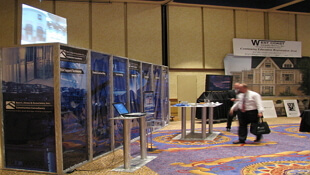
2009-With the success of the rear screen projection, BHA adds additional monitors to provide attendees with more information about BHA.
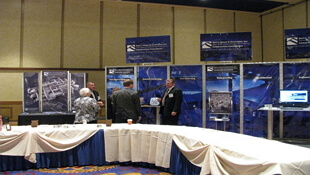
2010-BHA adds an interpretive professional development exhibit targeted to Building Envelope issues allowing adjusters and other non-construction professionals hands on access to the systems and components at the heart of many related such claims.


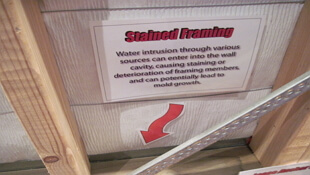
2011-BHA's Swing for Charity challenge is born.

2012-Always innovating, BHA expands its rear projection and professional development offerings to West Coast attendees.

2013-BHA showcases additional capabilities with a twenty-four foot, custom, convex, immersive video experience.

2014-BHA adds an iPhone display to give a hands-on demonstration of their data collection methods.
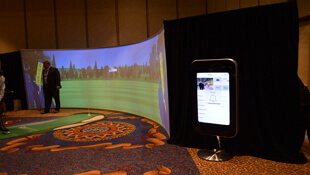
2015-BHA's twenty-four foot , custom, convex, immersive video experience was elevated with two additional rear projection screens, reflecting BHA's newest capabilities and services.

2016-BHA dazzles attendees with their new exhibit comprised of more than 15 integrated, high definition, LCD displays. iPads are stationed on tables to conveniently demonstrate BHA's data collection processes.
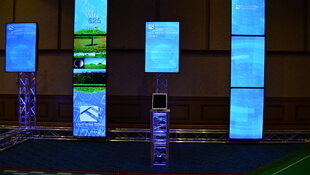
2017-BHA's Swing for Charity Golf Challenge raised $2,225.00 for the National Coalition for Homeless Veterans and $1,900 for Final Salute.
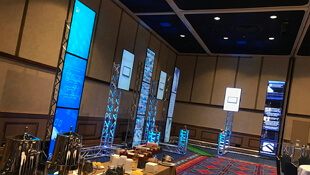
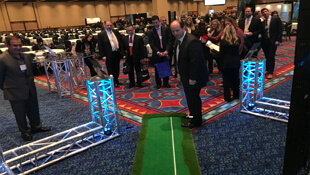
Read the court decisionRead the full story...Reprinted courtesy of
Georgia Court of Appeals Holds That Insurer Must Defend Oil Company Against Entire Lawsuit
October 07, 2019 —
Lawrence J. Bracken II, Michael S. Levine & Alexander D. Russo - Hunton Andrews KurthThe Georgia Court of Appeals recently affirmed a grant of summary judgment in favor of Mountain Express Oil Company on its breach of contract claim against liability insurer, Southern Trust Insurance Company. Empire Petroleum brought claims against Mountain Express for breach of contract, injunctive relief, and libel or slander, among others. Mountain Express sought a defense to that lawsuit under its insurance policy with Southern Trust. Southern Trust contended that the insurance policy did not cover Empire’s non-libel/slander claims, and therefore reimbursed Mountain Express for only a portion of its attorneys’ fees. After the Empire lawsuit settled, Mountain Express sued Southern Trust for breach of contract and bad faith for failing to pay the remaining defense costs, contending that Southern Trust had a duty to defend the entire lawsuit.
The Georgia Court of Appeals affirmed the trial court’s grant of summary judgment to Mountain Express on its breach of contract claim. Citing policy language stating that “[the insurer] will have the right and duty to defend the insured against any ‘suit’ seeking those damages,” the court held that Southern Trust was obligated to defend the entire lawsuit. Specifically, in reaching that conclusion, the court noted that by agreeing to defend any “suit,” not any “claim,” Southern Trust obligated itself to defend the entire lawsuit if any claim could be covered under the policy. Accordingly, Southern Trust breached the policy when it only agreed to defend some of the claims against its insured.
Reprinted courtesy of
Lawrence J. Bracken II, Hunton Andrews Kurth,
Michael S. Levine, Hunton Andrews Kurth and Alexander D. Russo, Hunton Andrews Kurth
Mr. Bracken may be contacted at lbracken@HuntonAK.com
Mr. Levine may be contacted at mlevine@HuntonAK.com
Read the court decisionRead the full story...Reprinted courtesy of
As the Term Winds Down, Several Important Regulatory Cases Await the U.S. Supreme Court
September 03, 2019 —
Anthony B. Cavender - Gravel2GavelThe Supreme Court will be deciding some very important regulatory law cases in the new few weeks as the term winds down.
CERCLA Circled
Last week, the Court granted a petition to review a significant CERCLA case, Atlantic Richfield Company v. Christian, et al., decided by the Supreme Court of Montana on state law grounds. This case involves state litigation which could result in a cleanup whose scope is allegedly inconsistent with an ongoing and expensive federal CERCLA cleanup at the Anaconda Smelter site. CERCLA basically provides that no one may challenge an ongoing Superfund cleanup, yet this state common law proceeding seeking a cleanup of the plaintiff’s homes and properties arguably threatens the EPA-approved cleanup remedy. ARCO filed a petition for certiorari with the Supreme Court, which the Court has now granted despite the Solicitor General’s brief which argued that the Court should wait to see the results of the Montana trial. (It is unusual for the Court to reject the advice of the Solicitor General.)
Read the court decisionRead the full story...Reprinted courtesy of
Anthony B. Cavender, PillsburyMr. Cavender may be contacted at
anthony.cavender@pillsburylaw.com
Two New Developments in Sanatoga, Pennsylvania
October 22, 2013 —
CDJ STAFFThe final touches are being put on two developments in Sanatoga, Pennsylvania. Southview, the larger of the two, comprises 35 single-family homes. Brookside comprises 16 single-family homes. During the next 18 months, the developers of the two communities will be responsible for the community improvements. If, after 18 months, these pass inspection, the township’s engineering firm will recommend that Sanatoga take responsibility for upkeep.
Read the court decisionRead the full story...Reprinted courtesy of
D.C. Decision Finding No “Direct Physical Loss” for COVID-19 Closures Is Not Without Severe Limitations
August 24, 2020 —
Michael S. Levine & Michael L. Huggins - Hunton Andrews KurthOn August 6, 2020, in Rose’s 1 LLC, et al. v. Erie Insurance Exchange, Civ. Case No. 2020 CA 002424 B, a District of Columbia trial court found in favor of an insurer on cross motions for summary judgment on the issue of whether COVID-19 closure orders constitute a “direct physical loss” under a commercial property policy.
At its core, the decision ignores key arguments raised in the summary judgment briefing and is narrowly premised on certain dictionary definitions of the terms, “direct,” “physical,” and “loss.” Relying almost entirely on those definitions – each supplied by the insureds in their opening brief – the court set the stage for its ultimate conclusion by finding “direct” to mean “without intervening persons, conditions, or agencies; immediate”; and “physical” to mean “of or pertaining to matter ….” The court then apparently accepted the policy’s circular definition of “loss” as meaning “direct and accidental loss of or damage to covered property.” Importantly, however, despite recognizing the fundamental rule of insurance policy construction that the court “must interpret the contract ‘as a whole, giving reasonable, lawful, and effective meaning to all its terms, and ascertaining the meaning in light of all the circumstances surrounding the parties at the time the contract was made,’” the court apparently ignored the insureds’ argument that the term “property damage” is specifically defined in the policy to include “loss of use” without any specific reference to physical or tangible damage.
Reprinted courtesy of
Michael S. Levine, Hunton Andrews Kurth and
Michael L. Huggins, Hunton Andrews Kurth
Mr. Levine may be contacted at mlevine@HuntonAK.com
Mr. Huggins may be contacted at mhuggins@HuntonAK.com
Read the court decisionRead the full story...Reprinted courtesy of




































































